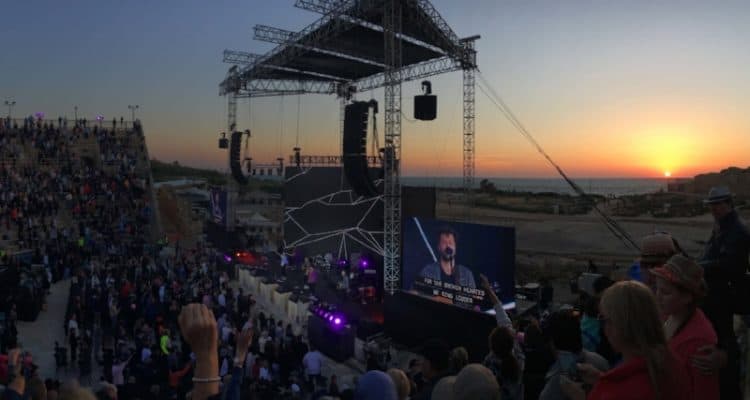
Growing up in the 90’s as an Evangelical kid who is part of the indigenous church in the Holy Land, we did not have Christian bookstores. Christian music resources were scarce. Those who had them, cherished them. Every birthday I would get a Hillsong worship album, and it’s hard to explain how much they meant. Often they were a gift from my now sister-in-law.
I looked through my worship CDs just a few days ago with fond memories as I recalled listening non-stop to Hillsong. Many of my CDs are nearly worn out, because of overuse!
I loved listening to Hillsong worship albums. As a teenager, whenever I had doubt, fear or uncertainty, their music helped me encounter Jesus. I imagine this is common for many teenage Christians in the Holy Land, and around the world, too. When the Israeli-Palestinian conflict became violent; when war, tension and fear surrounded me when I left my home; and when I feared for my family, the worship music of Hillsong reminded me that Jesus is with us. In this context, the music was hope.
Palestinian Christians are very sensitive to fellow Christians who come from across the world to see where Jesus walked, where Jesus was crucified and where He was risen. We share in their joy and awe as they engage in these experiences. Yet many times, when Christians come here from abroad they spend a lot of time looking at the ancient stones that witnessed the stories they love, yet they walk right past the living stones (as we refer to ourselves). Some of us can trace our ancestry all the way back to Pentecost. As a Palestinian Christian, I implore my fellow Christians from abroad to not only look at the stones that bear witness to our Scriptures, but also to the living stones who bear witness to Jesus’ presence in the Holy Land today. For me, encountering Jesus means being a peacemaker and bridge-builder for my people and my church.
As a Palestinian Christian, I implore my fellow Christians from abroad to not only look at the stones that bear witness to our Scriptures, but also to the living stones who bear witness to Jesus’ presence in the Holy Land today.
Imagine my excitement when, over lunch with my family, my sister-in-law told me that Hillsong would be performing in Israel. My sister and I wanted to see them, and we bought tickets with my sister-in-law to attend their second concert in Caesarea.
During the drive there, we brushed up on our familiarity with Caesarea and its biblical significance.
“Wasn’t this the place where the first non-Jew becomes a Christian? Maybe a Roman soldier or something?” I asked my sister-in-law.
“I don’t quite know,” she answered. We usually go there to walk along the beach. Maybe this is where Stephen was stoned to death? Something about martyrdom. That’s what I remember.”
“I’m sure the hosts of the concert will let us know,” I answered.
When we arrived, we followed the crowds. There were more than 20 busloads of people also waiting for the concert gates to open. As we found out, this Hillsong concert was part of a 2017 Hillsong Tour to the Holy Land, so tourists joining in this pilgrimage would get to hear their favorite band perform in the Holy Land. I thought this was a great marketing idea—locals would not be able to fill the large Roman amphitheatre, but with thousands of tourists, the venue filled up quickly.
As we waited for the concert, Matthew and Laurie Crouch welcomed everyone in attendance, along with the viewers on TV. I had never heard of the Crouches, but the audience seemed to know them, and cheered. As I paid attention to the logos on the screen, TBN (Trinity Broadcasting Network) was a co-host, along with Hillsong. The hosts seemed to know what they are doing and got the audience in a good mood, welcoming those coming from Australia, the USA, Canada, Singapore, the UK, and Mexico. Matthew was so delighted by the various nationalities present that he jokingly invited anyone from Madagascar to come on stage. There was no one from Madagascar.
Then, Matthew welcomed a special group in the audience, saying “We are delighted to welcome Israeli Messianic Jews that are here with us!” The crowd cheered, and some concert-goers stood to indicate their belonging to that group. I thought the host would continue to welcome other locals, but he stopped. He didn’t say anything about the Palestinian Christians in the audience.
I felt unrecognized. I am a local as well, but not an Israeli Messianic Jew. I knew other Palestinian Christians were in the audience. I shrugged at the irony of welcoming a Madagascan, but not the Palestinians who were among the attendees.
The hosts continued to invite another special guest. I had no idea who he was, but as soon as I Googled him, I couldn’t believe my eyes. He is described as an ardent Christian Zionist, who, among other things, denies the very existence of Palestinians. How awkward! My mind starting questioning my attendance. I wondered if Hillsong didn’t welcome Palestinians because they don’t believe we exist at all. I couldn’t believe it.
I wondered if Hillsong didn’t welcome Palestinian Christians because they don’t believe we exist.
Why didn’t the Hillsong website have this information online prior to the concert, so that the audience would have all the relevant information before attending? I could have spared myself the rush of anger, repulsion, and rejection that coursed through me at that time. In retrospect, though, how naive of me to think the concert wouldn’t be one-sided, that I would be welcomed to worship God in a place of mutual recognition. Perhaps I should have known. Hillsong is only performing in Israel, and not in Palestine. They are performing in leading holy sites and venues, in Israel. They are not making any political waves.
I don’t know about your city or country, but famous artists and musicians do not come to Israel and Palestine very often. When they do, the local communities jump at the opportunity to go to their concerts. We have had artists like Alicia Keys or Lauryn Hill cancel their appearances, due to political reasons. From my experience, every artist who comes to either Israel, Palestine, or both pays a political cost. Their choice of location is perceived as their binary view of support to either Israel or Palestine. In the case of Alicia Keys and Lauryn Hill, they were unable to satisfy both their Palestinian and Israeli fans, and preferred to cancel the whole show rather than come at all. Very few performing artists manage to maintain a win-win situation for both their Palestinian and Israeli fans, and this reflects the situation on the ground. You cannot perform for an audience of Israelis and Palestinians without being sucked into this zero-sum mentality.
I wanted to leave the concert before the Hillsong band even got on the stage. I hated the discoveries I was making. Why can’t we just go to a concert and enjoy the music? Had the organizers been open about their theological and political views ahead of time, some locals would have not attended. But by the time I realized this, I couldn’t leave. I was the driver and had passengers who wanted to stay.
Finally, the band came on stage and started performing. I struggled to sing along:
What fortune lies beyond the stars
Those dazzling heights too vast to climb
I got so high to fall so far
But I found heaven as love swept low
How can I sing these words when that love has been hijacked by an exclusive support that necessitates the denial of fellow brothers and sisters created in God’s image? My heart was beating and my soul was breathing to feel God’s love, despite the rejection I had just experienced. I laid out my anger, repulsion, and rejection and prayed for wisdom.
For me, the words of these songs resonate with a yearning for God’s dwelling among us:
What treasure waits within Your scars
This gift of freedom gold can’t buy
As the sun set and the band came close to finishing the concert, I looked around me and wondered what others were thinking, or praying. I came to be refreshed, and instead I found myself struggling to exist, in the same place where where Cornelius, a Roman centurion, became the first non-Jewish convert to Christianity…the place where Christianity first became a faith extending across ethnic and racial divides.
I came to be refreshed, and instead I found myself struggling to exist.
I decided to write a letter to Hillsong, not in a spirit of division but in a spirit of love. I extended an open invitation for Taya Smith, Joel Houston, Jonathan Douglas, Jad Gillies, Matt Crocker, and their musicians to come and visit with local Palestinian Christians. We want to share with Hillsong the treasures and freedom God has given us, in our context.
In the weeks that followed, I heard from many sisters and brothers who have dedicated their lives to be part of Hillsong. I learned about the work Catrina Henderson (part of the teaching staff of the Hillsong International Leadership College) is doing to build bridges, and I listened to the stories of all those who contacted me with such humility, in wanting to understand more and share their heart. I am humbled.
This openness and message of love speaks to us. To hear Joel Houston say that he’s never been so inspired as when he spent time with Palestinian Christians means so much. I value Joel’s heart. I agree that our job is to point to Jesus, and in my context we can be His bridge to peace. I pray that Hillsong continues to be an instrument to upcoming generations to encounter Jesus, and I thank them for their willingness not to walk past us, but to walk with us.
To hear that Hillsong is listening and does see us gives us hope. It means their music can continue to be a soundtrack for our prayers for peace, freedom and salvation. It means I can tell a generation of Palestinian youth that we are seen. That our lives and witness matter. Hillsong’s response means that we are not Invisible Christians, that the fire that fell at Pentecost has not gone out in the Holy Land, and that others can see our light. We are still here, worshipping, serving and seeking to love our neighbors—and even enemies—on a daily basis.
I work with a generation that needs anthems of hope. Otherwise, young people are left asking the church internationally, “We see you visit, but do you see us?” or “Banksy sees us, why won’t our sisters and brothers in Christ see us?”
Even nowadays when I face doubt, fear or uncertainty, the music of Hillsong still helps me encounter Jesus. Jesus transforms my pain and suffering into something good—transforms my doubt into faith, my despair into hope, my bitterness into love. As Hillsong so aptly expresses in the song Wonder, wonder happens when our eyes begin to open and we experience the wonder of the glimmer from the Light. Indeed, life bursts in different colors. I pray we can both see the wonder beyond the immediate pain of this exchange, and the despair that haunts the context of the Palestinian/Israeli conflict. Thank you for seeing us, Hillsong, because your heart sings,
I see the world in grace
I see the world in gospel
I see the world Your way
To our friends at Hillsong, and to all our Christian friends around the world, we invite you to come and spend more time with indigenous Christians in the Holy Land. Come and experience what God is doing among us. I invite you to share a table with us: with those of us who attended the Caesarea concert, with Palestinian Christians who were afraid to attend the concert, with fellow leaders who have a heart to see revival among our youth, and with Israeli friends who are also working to bring the Gospel to our context. Our invitation and our hearts are open. We hope to see you soon.
Shadia Qubti is a Christian Palestinian Israeli involved in many initiatives encouraging Palestinian women and youth to advocate for peace. Shadia was born and raised in Nazareth. She studied International Relations and English Language at the Hebrew University in Jerusalem, and Conflict Resolution and Nonviolent Action at Trinity College University in Dublin. For the last ten years she has served as Projects Manager in Musalaha, a BMS World Mission partner that promotes reconciliation between Israelis and Palestinians. Shadia has worked with Christ at the Checkpoint, Revival Generation, and Another Voice. This story first appeared on Come and See.


